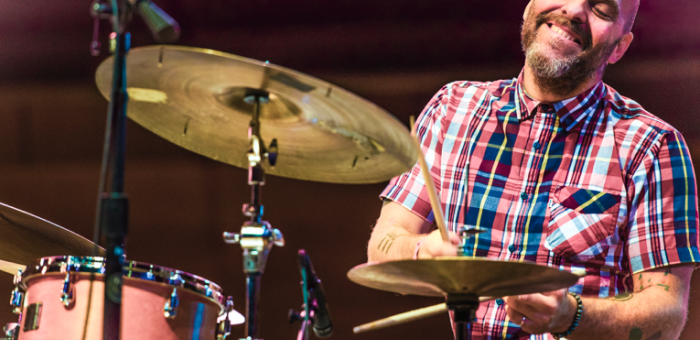Jan 13, 2026 2:09 PM
More Trump-Kennedy Center Cancellations
The fallout from the renaming of the John F. Kennedy Center for the Performing Arts to include President Donald…

Dave King, drummer for the trio The Bad Plus, performs at the Chicago Jazz Festival on Sept. 3.
(Photo: Michael Jackson)The 38th Annual Chicago Jazz Festival, a free event held Sept. 1–4, was blessed with perfect weather, a large, diverse, responsive audience and top-notch performances by local and nationally touring artists alike.
Highlights of the fest included the John Scofield/Joe Lovano Quartet; pianist Carla Bley conducting the Liberation Music Orchestra; The Bad Plus with guest stars; the trio Tarbaby with saxophonist Oliver Lake; trumpeter Christian Scott aTunde Adjuah; and 95-year-old conguero Candido Camero.
Resident artists such as bassist Tatsu Aoki, boogie pianist Erwin Helfer, drummer Michael Zerang’s Blue Lights and others also provided highlights, appearing in four dozen performances on stages in Millennium Park and the city’s nearby Cultural Center. Overall, attendance was conservatively estimated at 30,000.
Programmed, as it has been from the start, by a Jazz Institute of Chicago volunteer committee—which this year included DownBeat contributor Peter Margasak as well as resident drummer Mike Reed and guitarist Mike Allemana—the schedule was threaded with themes such as music confronting social issues, the ongoing influence of Ornette Coleman and Miles Davis, and the extraordinary virtuosity of musicians young and old, avant-garde and traditional.
Opening night trumpeter Orbert Davis celebrated the 100th anniversary of the start of the Great Migration (when Southern African Americans flocked to the industrial North) with a commissioned work for his septet, vocalist Maggie Brown and the Youth Brass Ensemble and String Quartet of the Chicago Jazz Philharmonic, which Davis runs.
Earlier that day, baritone saxophonist Mwata Bowden’s band—comprising tenor and soprano saxist Ari Brown, trumpeter Leon Q, bassist Harrison Bankhead, drummer Avreeayl Ra and poet Khari B.—portrayed the Migration’s resulting South Side community as an urban center bustling with individuality and spirit.
In keeping with the activism of its founder, bassist Charlie Haden (1937–2014), the Liberation Music Orchestra played songs alluding to ecological concerns in arrangements spare enough to encourage heterogeneous polyphony in a way Coleman, Haden’s mentor, would have called harmolodic.
The Bad Plus (pianist Ethan Iverson, bassist Reid Anderson and drummer Dave King) made its acknowledgement of Coleman more explicit, recruiting alto saxophonist Tim Berne, brass player Ron Miles and soprano saxophonist Sam Newsome for a performance that revisited Coleman’s 1971 album Science Fiction. Anderson bravely and capably essayed the two vocal tracks, originally sung by Asha Puthli, plucking his upright all the while.
Backed by bassist Ben Street and drummer Bill Stewart, Sco and Joe (as Scofield and Lovano have been affectionately called) showed how far catchy, bluesy Coleman-like motifs could be extended—with the duo’s compatible energies allowing for wild improvisation.
Playing as the ensemble Tarbaby, empathic pianist Orrin Evans, bassist Eric Revis, drummer Nasheet Waits and alto saxophonist Oliver Lake also used fragmentary, offbeat phraseology and extremes of pitch and timbre (central aspects of Coleman’s approach), but with a distinctly personal vocabulary.
Scott’s quintet advanced the disruptive path Miles Davis launched with Bitches Brew in its own brash “Stretch” music, encompassing hip-hop beats, Herbie Hancock’s “Eye Of The Hurricane” and ritual rhythms of the Mardis Gras Indians.
Tatsu Aoki’s MIYUMI Project—with Asian Improv colleagues Jon Jang (piano) and Francis Wong (tenor sax), several Chicago stalwarts and the Tsukasa Taiko troupe—exemplified multiculturalism. Similarly, Zerang’s Blue Lights quintet spun off Middle Eastern tropes.
Reedists Mars Williams and Dave Rempis (both with Zerang) demonstrated utter mastery of their horns, as did saxophonists Lovano, Eric Alexander (in a quartet featuring pianist Harold Mabern), JD Allen (with his trio), Jon Irabagon (in drummer Barry Altschul’s trio), Greg Ward (in drummer Charles Rumback’s Sextet), Tony Malaby (from the Liberation Music Orchestra) and Edwin Daugherty (whose sextet featured up-and-coming tenor player Irvin Pierce).
Other woodwind players of note included clarinetist Anat Cohen and tenor saxophonist Cameron Pfiffner, who led five more reedists in Adolphe’S AX. The sophisticated perfection of 87-year-old Benny Golson interpreting his classic “Whisper Not” might have been overlooked, given the high level of reed-playing overall.
There was too much happening to catch every act, but Candido offered a fitting finale. With a group of Latin jazz all-stars (including trombonist and shell player Steve Turre, percussionist Sammy Figueroa and pianist Elio Villafranca), Candido made melody simply, with just his fingertips on three tuned drums. The crowd roared.

Belá Fleck during an interview with Fredrika Whitfield on CNN.
Jan 13, 2026 2:09 PM
The fallout from the renaming of the John F. Kennedy Center for the Performing Arts to include President Donald…

Peplowski first came to prominence in legacy swing bands, including the final iteration of the Benny Goodman Orchestra, before beginning a solo career in the late 1980s.
Feb 3, 2026 12:10 AM
Ken Peplowski, a clarinetist and tenor saxophonist who straddled the worlds of traditional and modern jazz, died Feb. 2…

The success of Oregon’s first album, 1971’s Music Of Another Present Era, allowed Towner to establish a solo career.
Jan 19, 2026 5:02 PM
Ralph Towner, a guitarist and composer who blended multiple genres, including jazz — and throughout them all remained…

Rico’s Anti-Microbial Instrument Swab
Jan 19, 2026 2:48 PM
With this year’s NAMM Show right around the corner, we can look forward to plenty of new and innovative instruments…

Richie Beirach was particularly renowned for his approach to chromatic harmony, which he used to improvise reharmonizations of originals and standards.
Jan 27, 2026 11:19 AM
Richie Beirach, a pianist and composer who channeled a knowledge of modern classical music into his jazz practice,…